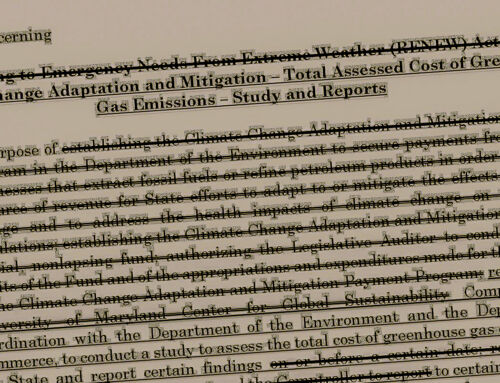View by Topic
Recent Articles
-
Maryland is About to Regulate Mold But is the Cart Before the Horse?Saturday, May 10th, 2025
-
New Environmental Laws from the 2025 Maryland Legislative SessionSaturday, April 26th, 2025
-
Migratory Bird Treaty Act Does Not Prohibit Incidental Take – AgainSaturday, April 19th, 2025
-
President Trump’s Bold Step to Rein in State Overreach in Climate ChangeSaturday, April 12th, 2025
View by Month/Year
“Green Building Law Update” Headlines
Recent Articles & News from
Stuart Kaplow’s blog
at GreenBuildingLawUpdate.com
- Maryland is About to Regulate Mold: But is the Cart Before the Horse? May 11, 2025
- BEPS Redux: The Most Far Reaching Environmental Legislation of the 2025 Maryland General Assembly May 4, 2025
- New Environmental Laws from the 2025 Maryland General Assembly Session April 27, 2025
- Migratory Bird Treaty Act Does Not Prohibit Incidental Take – Again April 20, 2025
Subscribe to the Green Building Law Update!
Stuart Kaplow brings his expertise and extensive experience to the table with his unique digital publication, "Green Building Law Update". Subscribers receive regular updates to keep them informed about important issues surrounding Environmental Law, Green Building & Real Estate Law, as well as the emerging demand for Environmental Social Governance (ESG).
Get fresh content through the lense of Stuart Kaplow's cutting-edge expertise, innovative commentary and insider perspective. Don't miss another issue! Subscribe below.

California Racial, Ethnic and LGBT Quotas for Company Boards Ruled Unconstitutional
Last Friday a California court ruled unconstitutional the state’s racial, ethnic, and LGBT quotas for corporate boards of directors. This now voided law had been an ideological lodestone for the “G” (governance) in ESG.
Superior Court judge, the Honorable Terry Green, granted the plaintiff’s motion for summary judgment without a trial in Robin Crest, et al. v. Alex Padilla (No.20ST-CV-37513), a lawsuit asking the court to declare the corporate board quota law unconstitutional under the U.S. and California constitutions.
The lawsuit filed October 2, 2020 on behalf of three California taxpayers, Robin Crest, Earl De Vires and Judy De Vires, sought to prevent California from enforcing Assembly Bill 979. AB 979 required that boards of directors of California based, public domestic or foreign corporations satisfy racial, ethnic, and LGBT quotas by the end of 2021.
It was clear to observers that constitutional norms were being ignored even in advance of AB 979 being signed into law on September 30, 2020, when the new Corporations Code section 301.4 required public companies headquartered in California to have at least one board director who is from an “underrepresented community” .. defined as “an individual who self-identifies as Black, African American, Hispanic, Latino, Asian, Pacific Islander, Native American, Native Hawaiian, or Alaska Native, or who self-identifies as gay, lesbian, bisexual, or transgender.” The law also required additional board members from underrepresented communities by the end of calendar year 2022, depending on the total number of members on a company’s board. Only 301 of the 716 public companies headquartered in California complied with the law last year, according to the Secretary of State. Companies that violated the law could have been fined $100,000 for the first violation and $300,000 for subsequent violations.
Even as it was considered by the legislature, debate included that should this law be judicially challenged, a reviewing court would find it violates the Equal Protection Clause of the U.S. Constitution and California’s Constitution section 31, which broader than the equal protection clause, categorically prohibits discrimination and preferential treatment.
The new law also flouted the U.S. Supreme Court’s Regents of the University of California v. Bakke 1978 decision which struck down race exclusive quotas as violative of the U.S. Constitution and the Civil Rights Act of 1964. This case is prescient with the U.S. Supreme Court soon to hear a challenge to Harvard University’s (a private institution) admission policies that are claimed to discriminate against Asian Americas.
It is suggested that the same fate will likely befall Maryland’s similar Corporate Diversity Law, enacted as House Bill 1210 in 2021 and effective July 1, 2022, unless possibly the yet to be issued regulations somehow cure the quota ‘problem’ in the statute including having express set asides based on racial, ethnic and sexual preference.
Despite that these two state laws run afoul of constitutional protections, ESG will no doubt thrive.
No party in this case challenged that as it stands today, corporate board seats by and large belong to members of one race, sexual orientation, and gender identity.
And as the judge noted, in a society based as ours is on inclusion and equal opportunity, in 2022 those observations are concerning on their own terms. Additionally, many would agree a homogenous board is vulnerable to stagnant thinking and common assumptions; it is also less flexible in responding to challenges. This results in poorer business practices, less innovation, and ultimately less profit. A heterogenous board potentially avoids these pitfalls and generally leads to a healthier business that makes more money. So, the legislature’s enactment may have been intuitively sensical, but it ignored that we are a nation with constitutional protections of the individual.
Corporations Code § 301.4 violates the Equal Protection Clause of the California Constitution on its face. It was a poor fix to a real problem by state legislators.
ESG will flourish as companies address inequality, including unequal access, systemic racism, gender discrimination, and lack of inclusion in their efforts to repair the world, not only driven by the marketplace, but to do the right thing.
ESG has become such a large component of my law practice that I am now collaborating with a fabulous group of attorneys in ESG Legal Solutions, LLC, a new law consulting firm. Nancy Hudes and I are now publishing a new blog at www.ESGLegalSolutions.com (.. yes, this webite will continue). This post originally appeared in that blog. If we can assist you or someone you work with in ESG strategy and solutions, from policy to project implementation (.. including GHG emission disclosures in response to the new SEC rule), do not hesitate to reach out to me.









